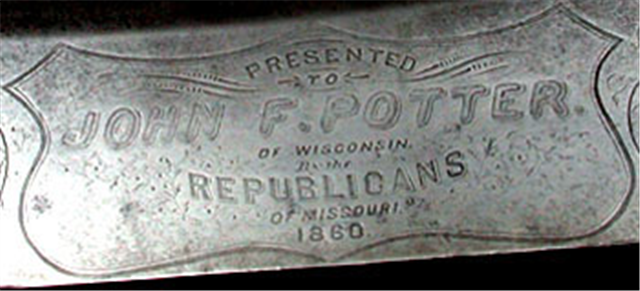On April 5, 1860, as tensions over slavery grew, Wisconsin Congressman John F. Potter was challenged to a duel by a pro-slavery colleague from Virginia. The argument led to a 31-pound, 6-foot-long folding knife and a story that made Potter famous.Gilman Halsted brings us the story.
It was April 5th of 1860. Just a year before the Civil War would begin. On the floor of Congress, Illinois Congressman Owen Lovejoy was gesticulating wildly as he delivered a blistering attack on slavery. Nearly a century later, historian William Hesseltine described the scene:
“Up jumped Virginia Congressman Roger Pryor and shook his fist in Lovejoy’s face while other pro slavery congressmen shouted out derisive comments like “Negro thief!” and “The meanest negro in the south is your superior.” Republicans on the other side of the aisle rose in defence of Lovejoy’s abolitionist speech. Among them Wisconsin’s John Fox Potter of Walworth county, his great black moustache bristling.”
The debate ended peacefully as Potter remembers it with Lovejoy finishing his speech from Clerk’s desk.
A few days later, Roger Pryor challenged John Fox Potter to a duel. He claimed Potter had tampered with the Congressional record by inserting language that was not part of the debate. Here’s how Potter remembered it in an interview he gave to the Chicago Tribune in 1896:
“That afternoon I got a note from Pryor challenging me to meet him in mortal combat. I believe that Pryor’s object in proposing a duel was to obtain an easy and cheap renown in his own section. I thought after all that had taken place it was not my duty to decline to fight. But I was not a good shot with a pistol and I did not purpose to have any hair trigger business. I proposed to bring the combat down to the first principles of human butchery. Therefore I accepted his challenge with the stipulation the weapons should be bowie knives and the encounter should take place in a closed room and the fight to go on till one or the other of us fell. Pryor refused on the grounds that the terms were barbarous.’ I replied that the custom of duelling itself was barbarous and inhuman.”
The duel never happened. District of Columbia police arrested both men to keep the peace and then released them on bond after tempers had cooled. But the event, according to historian Hesseltine, made Potter famous for his willingness to defy southern braggadocio.
“From all parts of the country, bowie knives came to Representative Potter,”wrote Hesseltine. “And the following month, the Missouri delegation to the Republican convention in Chicago carried a 7-foot bowie knife to present to the redoubtable champion of northern honour.”
To add insult to the already injured southern pride, the knife was inscribed with a pun that made fun of the Virginian Roger Pryor. It read, “to John Fox Potter who will always meet a Pryor engagement.” Potter was re-elected to another term and was known for the rest of his life as “Bowie Knife Potter.” Journalists dubbed it the “Monster knife” and it became a powerful symbol of northern opposition to slavery in the 1860s.
“We all felt that the time had come for some Northern man to lay aside this scruples and strike one blow that would convince the south that we were not to be bullied any longer,“ remembered Potter.
A year later the duel with bowie knives that never happened erupted into real shooting match with the outbreak of the Civil War.











